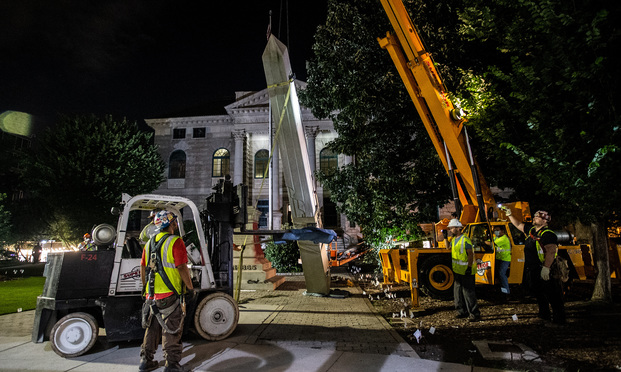'Erected to Intimidate': Confederate Monument Removed From DeKalb County Courthouse
DeKalb County Superior Court Judge Clarence Seeliger had declared the monument a public nuisance and ordered the county to remove it.
June 19, 2020 at 01:34 PM
5 minute read
 Workers remove a Confederate monument with a crane Thursday night in Decatur. The 30-foot obelisk in Decatur square, erected by the United Daughters of the Confederacy in 1908, was ordered by a judge to be removed and placed into storage indefinitely. (Photo: Ron Harris/Associated Press)
Workers remove a Confederate monument with a crane Thursday night in Decatur. The 30-foot obelisk in Decatur square, erected by the United Daughters of the Confederacy in 1908, was ordered by a judge to be removed and placed into storage indefinitely. (Photo: Ron Harris/Associated Press)
As workers removed a massive Confederate obelisk from the old DeKalb County Courthouse Thursday night, attorney Mawuli Davis celebrated with a countdown to Juneteenth.
"This was mounted and erected to intimidate our ancestors," said Davis as he livestreamed the removal of the 112-year-old, 30-foot-tall monument. Davis is a partner at the Davis Bozeman Firm in DeKalb County and co-chair of the Beacon Hill Black Alliance for Human Rights.
The monument was erected in 1908, the year that Davis said Georgia stripped away voting rights granted to its black citizens during Reconstruction, and just two years after a white mob killed dozens of black men and women in a race riot that became known as the Atlanta Massacre.
The obelisk base was inscribed with a narrative that promoted states rights even as it romanticized the defeated Confederacy in what became known as the "Lost Cause."
Juneteenth commemorates the day in 1865 that black slaves in Texas belatedly learned the Emancipation Proclamation had freed them in January 1863.
Thursday's removal comes as Confederate memorials across the nation are being targeted as antiquated tributes to white supremacy. The renewed attention has been driven by national protests that erupted following the death of Minneapolis resident George Floyd at the hands of white police.
"This is a victory. We're gonna claim it for … young black and brown children of African descent who are saying, 'Take this thing down,'" Davis said as the monument was hoisted into the air.
"They are rolling this baby out. They are rolling it out of here, and we are witnesses," Davis said to chants of "Take it down."
Last Friday, DeKalb County Superior Court Judge Clarence Seeliger declared the monument a public nuisance and gave the county two weeks to remove it. The action was a fitting bookend to the 78-year-old judge's career on the bench. Seeliger will retire in December.
As a young Emory University law school graduate, Seeliger won his seat by challenging DeKalb County State Court Judge J. Oscar Mitchell, who had sent Martin Luther King Jr. to state prison for violating probation for a $25 traffic ticket.
Once Seeliger took the bench, he hired the DeKalb County court system's first African-American employee as his bailiff and became the first DeKalb judge to remove the Confederate battle flag from his courtroom.
Seeliger held that the obelisk had become an increasingly frequent target of graffiti and vandalism, "a figurative lightning rod for friction among citizens, and a potential catastrophe that could happen at any time if individuals attempt to forcibly remove or destroy it." He directed that the obelisk be removed undamaged and stored "out of public view."
On Friday, Seeliger declined to comment other than to say, "The order speaks for itself."
Seeliger issued the order in response to an emergency motion filed last week by Decatur City Attorney Bryan Downs, who as the sole plaintiff sought to declare the monument a public nuisance. Downs did so, citing protests provoked by George Floyd's death and demonstrators who repeatedly defaced the monument and called for it to come down, by force if necessary.
The state public nuisance law may be invoked by only four county officials—the city attorney, the county attorney, the district attorney or the county solicitor, said Downs, a founding partner at Wilson, Morton & Downs in Decatur. Although the obelisk sits on county property, "It's smack dab in the middle of our city square," he said. "That's why I had standing to file the suit."
Decatur city commissioners, the mayor and the city manager "blessed this action," he added.
Downs named DeKalb County as the sole defendant. County officials never filed a response, and no one moved to intervene. At an emergency hearing last Friday, county lawyers stipulated to the facts, Downs said.
The public nuisance law gave Downs legal leeway to have the monument taken down despite a 2019 state law intended to preserve Confederate monuments. That law bars the removal, relocation, concealment or alteration of historical monuments unless efforts are made to preserve them and relocate them to sites of similar prominence.
Any person or entity that damages or removes a monument without replacing it is also subject to treble damages for the full cost of repair and replacement under the law, unless removal is authorized by the public entity that owns it.
Downs said the county commission previously tried to relocate the obelisk in accordance with that law but no one would take it. After George Floyd's death, it became a lightning rod. There was "serious chatter … about forcibly taking it down," he said.
"We truly do not want something bad to happen. And every day it sits out there, something bad could happen," he said.
Downs wanted it taken down immediately. Seeliger gave the county two weeks to comply. As the clock struck midnight on Juneteenth, county workers who arrived around 11 p.m. with a crane and heavy equipment, hoisted the monument high in the air and then hauled it away to cheers and applause from the crowd.
This content has been archived. It is available through our partners, LexisNexis® and Bloomberg Law.
To view this content, please continue to their sites.
Not a Lexis Subscriber?
Subscribe Now
Not a Bloomberg Law Subscriber?
Subscribe Now
NOT FOR REPRINT
© 2025 ALM Global, LLC, All Rights Reserved. Request academic re-use from www.copyright.com. All other uses, submit a request to [email protected]. For more information visit Asset & Logo Licensing.
You Might Like
View All
Georgia Republicans Push to Limit Lawsuits. But Would That Keep Insurance Rates From Rising?
5 minute read
A Plan Is Brewing to Limit Big-Dollar Suits in Georgia—and Lawyers Have Mixed Feelings
10 minute readTrending Stories
- 1Ex-Prosecutor’s Trial Ends as Judge Throws Out Her Felony Indictment in Ahmaud Arbery Death Case
- 2Conversation Catalyst: Transforming Professional Advancement Through Strategic Dialogue
- 3Trump Taps McKinsey CLO Pierre Gentin for Commerce Department GC
- 4Critical Mass With Law.com's Amanda Bronstad: 700+ Residents Near Ohio Derailment File New Suit, Is the FAA to Blame For Last Month's Air Disasters?
- 5Law Journal Column on Marital Residence Sales in Pending Divorces Puts 'Misplaced' Reliance on Two Cases
Who Got The Work
J. Brugh Lower of Gibbons has entered an appearance for industrial equipment supplier Devco Corporation in a pending trademark infringement lawsuit. The suit, accusing the defendant of selling knock-off Graco products, was filed Dec. 18 in New Jersey District Court by Rivkin Radler on behalf of Graco Inc. and Graco Minnesota. The case, assigned to U.S. District Judge Zahid N. Quraishi, is 3:24-cv-11294, Graco Inc. et al v. Devco Corporation.
Who Got The Work
Rebecca Maller-Stein and Kent A. Yalowitz of Arnold & Porter Kaye Scholer have entered their appearances for Hanaco Venture Capital and its executives, Lior Prosor and David Frankel, in a pending securities lawsuit. The action, filed on Dec. 24 in New York Southern District Court by Zell, Aron & Co. on behalf of Goldeneye Advisors, accuses the defendants of negligently and fraudulently managing the plaintiff's $1 million investment. The case, assigned to U.S. District Judge Vernon S. Broderick, is 1:24-cv-09918, Goldeneye Advisors, LLC v. Hanaco Venture Capital, Ltd. et al.
Who Got The Work
Attorneys from A&O Shearman has stepped in as defense counsel for Toronto-Dominion Bank and other defendants in a pending securities class action. The suit, filed Dec. 11 in New York Southern District Court by Bleichmar Fonti & Auld, accuses the defendants of concealing the bank's 'pervasive' deficiencies in regards to its compliance with the Bank Secrecy Act and the quality of its anti-money laundering controls. The case, assigned to U.S. District Judge Arun Subramanian, is 1:24-cv-09445, Gonzalez v. The Toronto-Dominion Bank et al.
Who Got The Work
Crown Castle International, a Pennsylvania company providing shared communications infrastructure, has turned to Luke D. Wolf of Gordon Rees Scully Mansukhani to fend off a pending breach-of-contract lawsuit. The court action, filed Nov. 25 in Michigan Eastern District Court by Hooper Hathaway PC on behalf of The Town Residences LLC, accuses Crown Castle of failing to transfer approximately $30,000 in utility payments from T-Mobile in breach of a roof-top lease and assignment agreement. The case, assigned to U.S. District Judge Susan K. Declercq, is 2:24-cv-13131, The Town Residences LLC v. T-Mobile US, Inc. et al.
Who Got The Work
Wilfred P. Coronato and Daniel M. Schwartz of McCarter & English have stepped in as defense counsel to Electrolux Home Products Inc. in a pending product liability lawsuit. The court action, filed Nov. 26 in New York Eastern District Court by Poulos Lopiccolo PC and Nagel Rice LLP on behalf of David Stern, alleges that the defendant's refrigerators’ drawers and shelving repeatedly break and fall apart within months after purchase. The case, assigned to U.S. District Judge Joan M. Azrack, is 2:24-cv-08204, Stern v. Electrolux Home Products, Inc.
Featured Firms
Law Offices of Gary Martin Hays & Associates, P.C.
(470) 294-1674
Law Offices of Mark E. Salomone
(857) 444-6468
Smith & Hassler
(713) 739-1250








